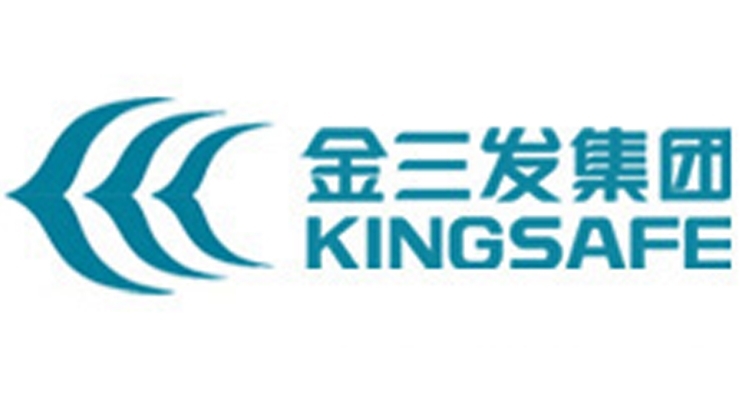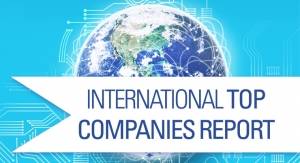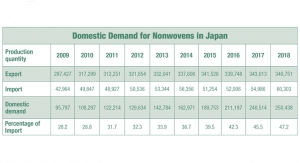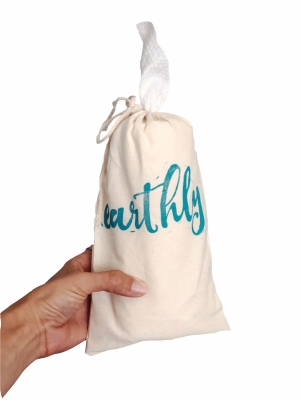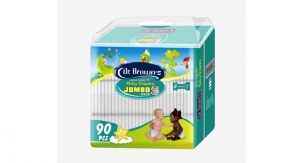09.11.17
Changxing County Zheijiang, China
www.kingsafe.com
2017 Nonwovens Sales: $385 million
Key Personnel
Yan Huarong
Plants
Zhengjia, Guangdong, China
Processes
Spunlace, spunbond, meltblown, hot air
Zhejiang Kingsafe Group is a high-tech enterprise integrating production, research and development, design and sales of nonwoven materials and hygiene products. The company operates a range of advanced production equipment and technology from Germany, France, Switzerland, Japan and Taiwan at its plants in Zhejiang and Guangdong. This enables the company to provide a variety of products including spunlace nonwoven fabric, functional composite nonwoven fabric, filament fiber fabric and other products.
Compared to 2016, in 2017, Kingsafe’s sales increased 3.9% to $385 million while volumes increased 17.6% to 80,940 tons. Based on positive outlook for future medical and hygiene market needs in nonwovens, wet wipes, dry soft wipes and baby diapers, Kingsafe further extended its value chain with heavy investment in materials for wet wipes, dry soft wipes, and baby diapers. At the end of 2017, two additional hot air nonwovens production lines were added and in June 2018, one Dilo spunlace line with two parallel carding machines were put into operation, adding 6000 tons of hot air nonwovens and 18,000 tons of spunlace nonwovens to the annual capacity.
Kingsafe has been focusing on investing in research and development and developing high and new nonwovens materials and products for years.
The company also formed Zhejiang provincial nonwoven material institute, Zhejiang Kingsafe Composite Nonwoven Fabric Institute, and established a post-doctoral workstation on the base of “Zhejiang provincial ecological interlining research and development center” and “Zhejiang Kingsafe Nonwoven Fabric Co., Ltd, Zhejiang provincial enterprise technology center.” With local talents and first-class testing equipment and instruments imported from Germany, Switzerland, Japan and other countries, the company is ambitious to keep growing and expanding in the nonwovens industry value chain with plans to establish new plants in Wuhan and Xi’an to produce more value added high performance products.
The company also will expand its presence in South, West, Central, Northwest, North China and gradually cover the inland market of China with an aim to increase its marketshare in the country.
In July 2018, Kingsafe hosted the “Win in the Future” event at the Intercontinental Hotel in Shanghai and launched three new baby diaper lines in the presence of nationwide disposable personal care product manufacturers and distributors from baby diapers, wet wipes, dry soft wipes and facial mask segments.
Although China and the U.S. are rivals on trade issues with tariff increases in many sectors, currently there is no clear impact on the nonwovens business—because few nonwoven roll goods are exported to the U.S. as the country leads the business in production and technology development perspective around the world. The raw material price decrease and the local demand increase may be good news, but the dollar appreciation should also be considered.
www.kingsafe.com
2017 Nonwovens Sales: $385 million
Key Personnel
Yan Huarong
Plants
Zhengjia, Guangdong, China
Processes
Spunlace, spunbond, meltblown, hot air
Zhejiang Kingsafe Group is a high-tech enterprise integrating production, research and development, design and sales of nonwoven materials and hygiene products. The company operates a range of advanced production equipment and technology from Germany, France, Switzerland, Japan and Taiwan at its plants in Zhejiang and Guangdong. This enables the company to provide a variety of products including spunlace nonwoven fabric, functional composite nonwoven fabric, filament fiber fabric and other products.
Compared to 2016, in 2017, Kingsafe’s sales increased 3.9% to $385 million while volumes increased 17.6% to 80,940 tons. Based on positive outlook for future medical and hygiene market needs in nonwovens, wet wipes, dry soft wipes and baby diapers, Kingsafe further extended its value chain with heavy investment in materials for wet wipes, dry soft wipes, and baby diapers. At the end of 2017, two additional hot air nonwovens production lines were added and in June 2018, one Dilo spunlace line with two parallel carding machines were put into operation, adding 6000 tons of hot air nonwovens and 18,000 tons of spunlace nonwovens to the annual capacity.
Kingsafe has been focusing on investing in research and development and developing high and new nonwovens materials and products for years.
The company also formed Zhejiang provincial nonwoven material institute, Zhejiang Kingsafe Composite Nonwoven Fabric Institute, and established a post-doctoral workstation on the base of “Zhejiang provincial ecological interlining research and development center” and “Zhejiang Kingsafe Nonwoven Fabric Co., Ltd, Zhejiang provincial enterprise technology center.” With local talents and first-class testing equipment and instruments imported from Germany, Switzerland, Japan and other countries, the company is ambitious to keep growing and expanding in the nonwovens industry value chain with plans to establish new plants in Wuhan and Xi’an to produce more value added high performance products.
The company also will expand its presence in South, West, Central, Northwest, North China and gradually cover the inland market of China with an aim to increase its marketshare in the country.
In July 2018, Kingsafe hosted the “Win in the Future” event at the Intercontinental Hotel in Shanghai and launched three new baby diaper lines in the presence of nationwide disposable personal care product manufacturers and distributors from baby diapers, wet wipes, dry soft wipes and facial mask segments.
Although China and the U.S. are rivals on trade issues with tariff increases in many sectors, currently there is no clear impact on the nonwovens business—because few nonwoven roll goods are exported to the U.S. as the country leads the business in production and technology development perspective around the world. The raw material price decrease and the local demand increase may be good news, but the dollar appreciation should also be considered.

